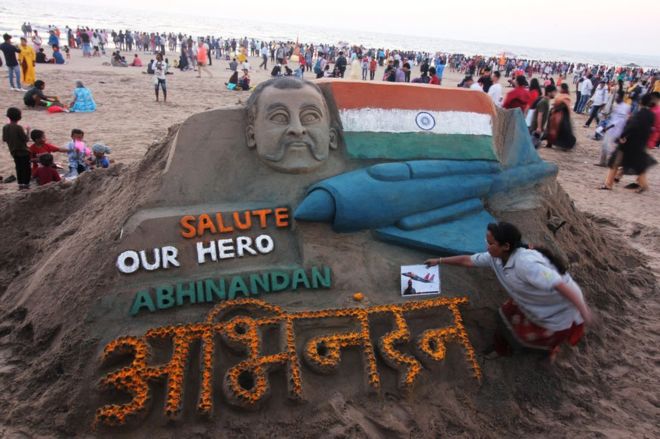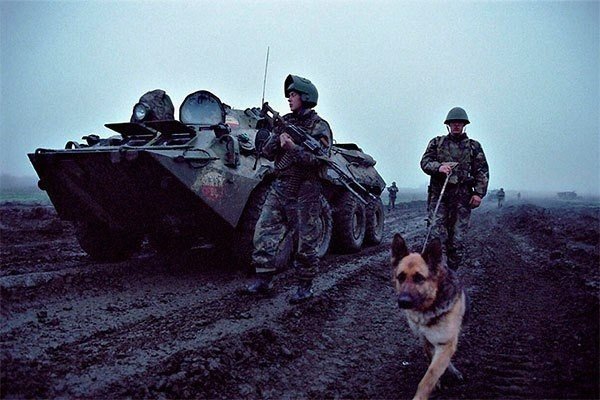The web site Russian Council on International Affairs (RSMD) published an article by researcher Strategy and Technology Analysis Center (CAST) and expert INF Timothy Borisova “India and Pakistan: conflict with the positive sum”, which states, that February 2019 the year was marked by a sudden exacerbation of the conflict between India and Pakistan, which caused a strong reaction of the media and has generated discussion about potential scenarios for until the beginning of full-scale war and a nuclear exchange. How justified are these fears? What factors led to the current escalation? Can we consider the results of this episode in terms of a "winner" and "loser"? What are the prospects for the normalization of relations between the two South Asian states

Sandy composition on the beach in India in honor of the return to the homeland was shot down and captured by the Pakistani side of the Indian Air Force pilot Wing Commander Abhinandana Varthamana, 01.03.2019 (from) Getty Images / BBC
From Pulvamy to Balakot
14 February 2019 g. County Pulvama Indian state of Jammu and Kashmir has suffered a major terrorist attack in recent years, which claimed the lives of at least 40 Forces personnel of the Central Reserve Police (Central Reserve Police Force, CRPF). Claimed responsibility terrorist organization "Jaish-e-Muhammad", based in Pakistan.
certainly, This incident was a shock for the general Indian public, and for the country's leadership. It is quite expected was immediate reaction of the Indian government in the diplomatic field - Pakistan has been accused of supporting terrorists, India announced the cancellation of most favored trade relations with its neighbors and intensify its policy of international isolation. I could not affect the position of New Delhi and the fact, Pakistan issued a formal condemnation of the terrorist attack and proposed a joint investigation. the level of trust between the two countries for this kind of interaction is too low. Indian authorities argued the refusal to cooperate in order, that Pakistan has repeatedly provided information on operating in its territory banned organizations, responsible, in particular, for terakt 2008 g. in Mumbai, but Islamabad did not take in the least active steps to deal with them.
Such charges and methods of political pressure in the Indo-Pakistani relations are not new. factor is, contribute to the further aggravation of the situation, served as the coming in April - May 2019 g. Parliamentary elections in India. The logic of the struggle for votes has forced Prime Minister Narendra Modi to take more decisive and strict measures. morning 26 February fighters Dassault Mirage 2000H / I from the 7th Squadron Indian Air Force dropped bombs driven by the intended camp group "Jaish-e-Muhammad" near the town of Balakot in Pakistan's Khyber Pakhtunkhwa. officially operation, It became the first case of application of the Indian military aircraft to attack on the territory of Pakistan 1971 of the year, It was presented as a "preemptive strike" to protect against terrorist attacks being prepared against India.
Pakistani side the answer is not long in coming - 27 Pakistan Air Force in February to demonstrate the capabilities raided the territory of India and in the ensuing air battle shot down over the Line of Control MiG-21bis UPG (Bison) BBC India. The plane crashed in the territory, Pakistan-controlled, manage it Wing Commander (lieutenant colonel) Abhinandan Varthaman could catapult, but he was captured. It only confirmed the two sides fighting the loss of equipment during the conflict in question.
The step from nuclear war?
Despite, what happened was knocked out of the ordinary logic of the development of Indo-Pakistan relations in recent years,, predictions about the possible start of full-scale war represented ill-founded. This date is not interested neither of the parties to the conflict. Which came to power in Pakistan in July 2018 g. Party "Tehreek-e-Insaf" ("Movement for Justice") headed by Prime Minister Imran Khan aspires to pursue a balanced foreign policy, aimed at improving the country's image, establishing long-term mutually beneficial relationships with partners and to attract investment in the economy is experiencing difficulties. While the current Indian government is under serious pressure and criticism in various directions, including the military sphere, the opposition, and seeks to minimize reputational risks in the run-up to elections.
A common mistake when comparing the military potentials of the two countries is the emphasis on the analysis of quantitative indicators, difference that, one side, evident, on the other - it is not always crucial in the outcome of war. Much more important to pay attention to the quality characteristics. Pakistan, With fewer resources, able to build a balanced military, who are highly professional and have a diverse combat experience.
India, in its turn, having the advantage in terms of the size of the armed forces and the amount of military equipment, experiencing some difficulties, affecting their efficiency. One of the most acute problems, which recognizes the Ministry of Defense, is aging fleet of military aircraft and an acute shortage of new fighters. conflict occurred, with high probability, It leads to activation of the internal discussions on the next revision of the defense procurement procedures towards simplification, as well as the acceleration of specific programs, mainly for the purchase of tender 114 multi-role fighters for the Indian Air Force.
International response and configuration of interests in the region
Assessing the response of external actors, such as the US, China, Russia, on the events described, it should be noted major changes, taking place in the system of international relations in South Asia.
Pronounced the block character of the bipolar system of the Cold War period, making the choice of the parties to the Indo-Pakistani conflict more obvious. Today, however, the mutual political and economic dependence of the South Asian countries and great powers, stakeholders promoting their own interests in the region, significantly increased.
So, for the United States, Pakistan is a key mediator in crucial negotiations with the "Taliban" movement for a peaceful settlement in Afghanistan. India, in its turn, It is a central element of the Indo-Pacific US strategy of containment of China. The need to maintain a balance has led to some controversy in the American political establishment. The US State Department has expressed its condolences to India in connection with the attack in Kashmir and urged all countries (obviously, referring mainly Pakistan) stop shelter on its territory and support terrorists. Literally every other day, Senator Lindsey Graham during a personal meeting with Pakistani Foreign Minister Mahmood Qureshi on the sidelines of the Munich Security Conference, said, that he was "impressed" Islamabad achievements in the fight against terrorism.
China, which for many years it is a close military and political partner of Pakistan, also appeared in a difficult situation. Beijing is interested in stability and security in the region, needed to implement large-scale economic projects within the zone of the Initiative and the way. Against this background, there has recently been a positive dynamics in the Sino-Indian relations. Taking into account the above factors, China was limited to a neutral statement, expressing hope for resolution of the conflict through dialogue.
Description of Russian-Indian relations as a time-tested, characterized by a high degree of confidence and the lack of differences on matters of principle, for a long time and just become a commonplace. 28 February, President of Russia Vladimir Putin held a telephone conversation with Prime Minister Modi, in which he once again (14 February telegram was sent) He expressed condolences to the people of India in connection with the attack, and hope for a speedy resolution of the crisis in the relations between India and Pakistan. However, the situation is complicated by for Moscow, that 2017 g. India and Pakistan are members of the Shanghai Cooperation Organization. Besides, in recent years, the development of bilateral Russian-Pakistani relations, in particular, on counterterrorism track.
In this way, way out of the crisis is possible only if a direct bilateral dialogue between India and Pakistan.
Return to normal and further prospects
The formal reason for de-escalation was the homecoming was taken prisoner by the Indian pilot. In this particular result of this is a transient exacerbation by the fact, that each party has the opportunity to announce his military and diplomatic success.
The Pakistani position is that, that the country has shown a low profile and peacefully, initially opposing the escalation and suggest partnership. Then, I am forced to answer, It has demonstrated its military potential, sbiv MiG-21bis UPG and Su-30MKI (not confirmed), and after - has initiated to reduce tension and as a "conciliatory gesture" returned the Indian pilot detained.
India, in its turn, said the successful attack on the camp of militants (Pakistan denies causing any damage to material objects in their own territory) and preventing future attacks. Besides, reported downed Wing Commander Abhinandanom Varthamanom Pakistani F-16s (not confirmed), and his return from captivity is presented as a result of pressure on Pakistan and a major diplomatic victory.
Users of social networks and local media will be a long time to discuss the details of the incident, lead various arguments and "proofs" to each of the viewpoints, but all this does not matter much. Important, that none of the parties to the conflict does not consider itself restricted and requires no revenge, which creates conditions for the return to the status quo and peaceful expectations of election results in India. Furthermore, this year still retains the potential for positive developments in Pak-India relations.
One factor, contributing to warming, may become tougher action against the terrorist organizations in Pakistan, such as "Lashkar-tajba" and the previously mentioned "Jaish-e-Muhammad". According to the Minister of Information and Broadcasting of Pakistan Chaudhry Fawad, Government has already taken the appropriate decision.
Besides, at 2019 g. marks 550 anniversary of the founder of the religion of Sikhism Guru Nanak Dev. In this regard, by mutual agreement at the end of 2018 the official start of construction of the so-called corridor was given Kartarpurskogo, which is intended to connect the Indian city of Dera Baba Nanak and Pakistan Kartarpur, which will significantly simplify visiting shrines are located in (gurdvar) Sikhs pilgrims. Currently, they have to obtain a visa and the length of the route to overcome 125 km through Lahore, despite, temples that are located within the line of sight. The successful implementation of the project, without exaggeration, can be regarded as a breakthrough in bilateral relations, however, this will require political will on both sides.











